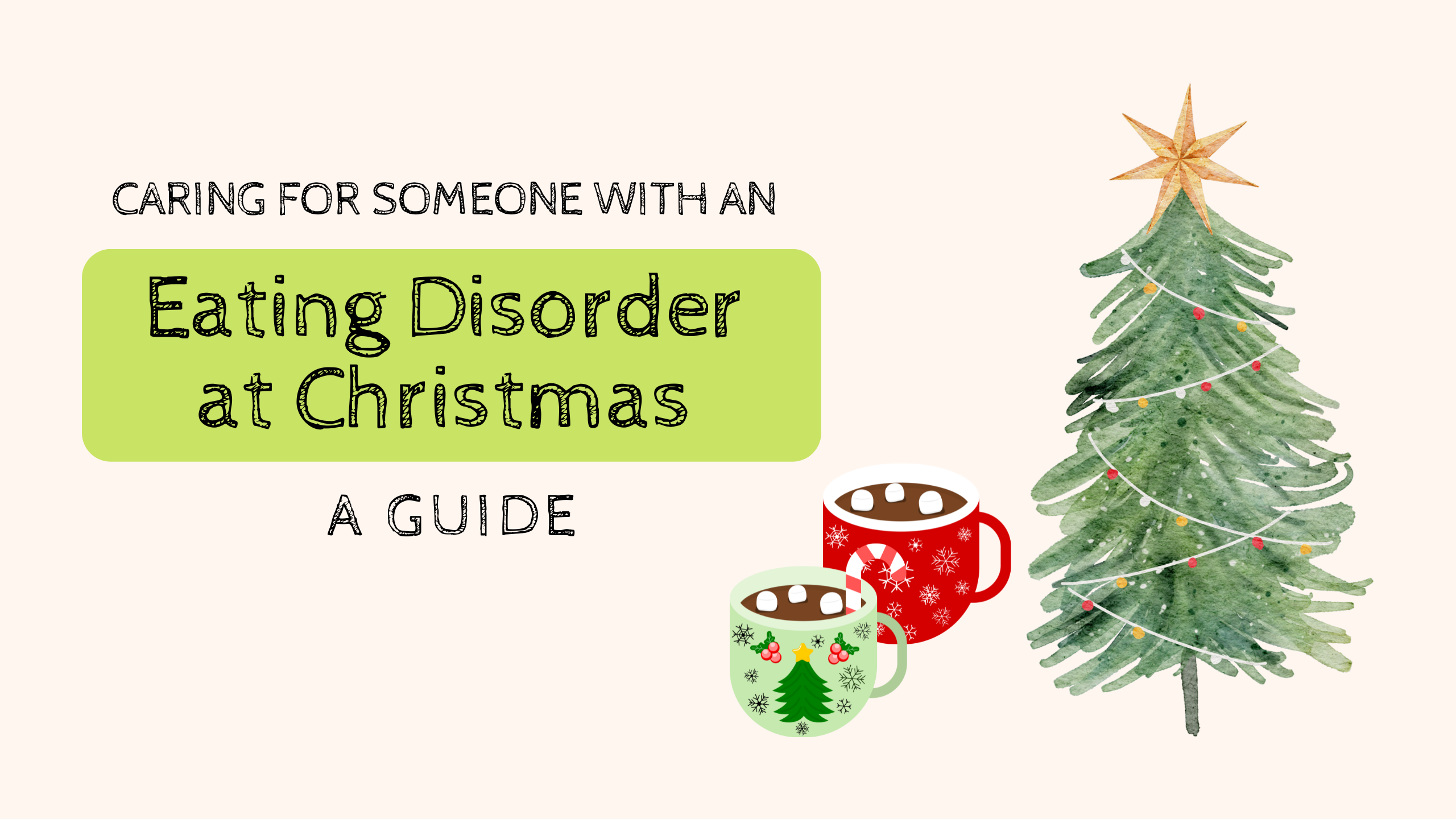
Nurturing loved ones through Christmas eating disorders
At Christmas, eating disorders can be super challenging to navigate. All the social activities and abundant meals, can be a challenging time for individuals with eating disorders and their supporters. As someone who cares for or supports someone with an eating disorder, it’s crucial to approach the holiday season with sensitivity, understanding, and the right mindset.
Whether you are a parent, partner, housemate or other carer, knowing how to support a loved one can make the Christmas season more comfortable. In this guide, we are going to explore practical tips and strategies to help Christmas feel more manageable for someone who has an eating disorder. It’s so key to work on a supportive and nurturing environment during this festive time.
Understanding the challenges
The holiday season, often centered around food-centric gatherings, can intensify the struggles faced by individuals with eating disorders at Christmas. The pressure to participate in festive meals and navigate comments from well-meaning relatives can be overwhelming. Ugh those diet culture comments about weight, shape and diets need to be banned, in my opinion. I’ve first hand experience of how unhelpful they can be. Memories of comments made on how much weight I had lost, or how big my bum was looking, now means that kind of talk is banned round our table. More on this later in the blog.
Rather than trying to tackle the whole festive season head-on, we’ve broken the key challenges down into areas to focus on to help you, and to help those you are supporting. So let’e dive in!

Creating a supportive environment at Christmas for Eating Disorders:
Talking about potential problems prior to the day can help to set those expectations. It is easy to assume or try to second guess what is in someones head, but also easy to get this wrong! Even as a experienced eating disorders dietitian I know I can get this wrong. Now I have learnt not to assume, instead to ask nuturing, compassionate questions and see what the answers are. For example “I know Christmas may seen overwhelming to you this year and I really want to support you in the best way, would you be able to tell me your biggest concerns?”
So my first bit of advice is to find a calm time to have a chat through everyones concerns about Christmas. This could be done either as a family or just with one individual. Either way the plan can be passed on to the rest of the family – whatever feels most manageable.
I would totally suggest planning as much of the festive period as you can. Have a rough schedule for the holidays which highlights where meals will be, which meals will be different and if anyone different will be eating with you too. Ask if any of the plan seems too much and how to make it more manageable. You may need to do some preparation around eating beforehand.
Safe Spaces, Expectations and a Distress Signal:
- Openness and trust: Have open communication with your loved one about their concerns and fears related to the holiday season. No worry is too silly or small to bring up. Create a safe space for them to express their feelings without judgment and let them know they are loved no matter what. Put on those compassionate glasses.
- Setting realistic expectations: Discuss and plan realistic expectations for the holiday gatherings. This might include planning shorter visits to others peoples houses, less meals out or taking safe foods with you to eat on the way/when there. It is key not to skip parts of the meal plan. Remember recovery takes time and next year will be probably very different.
- Choose a distress signal! Agree to have a signal if things are all getting too much. If you are anticipating difficult conversations or scenarios, this may be really helpful. This could be sitting opposite each other so you can have a set hand signal, texting an emoji or having a code word. It can be really hard when you have an eating disorder to ask for help, so trying to anticipate this and plan to make it as simple as possible can help. I used to do this all the time with my bestie, one look and we both knew the other needed support.
Eating disorder allies
- Educate close friends and family: Share information about eating disorders with close friends and family members who will be present during holiday events if you know this will help. This is totally about picking the right people to share with and agreeing it. Creating better awareness can lead to more supportive and understanding interactions. It can also at times lead to awkward questions and comments so try to be sensitive and considerate about who you share that information with. Remember that an eating disorder is a sensitive issue, and privacy is key too.
- Assign a supportive ally: Identify a trusted family member or friend who can act as a supportive ally during gatherings, helping to deflect potentially triggering comments and offering encouragement. A supportive ally will be in the corner of the person with an eating disorder. Having a second voice to help can be crucial for a smoother holiday season.
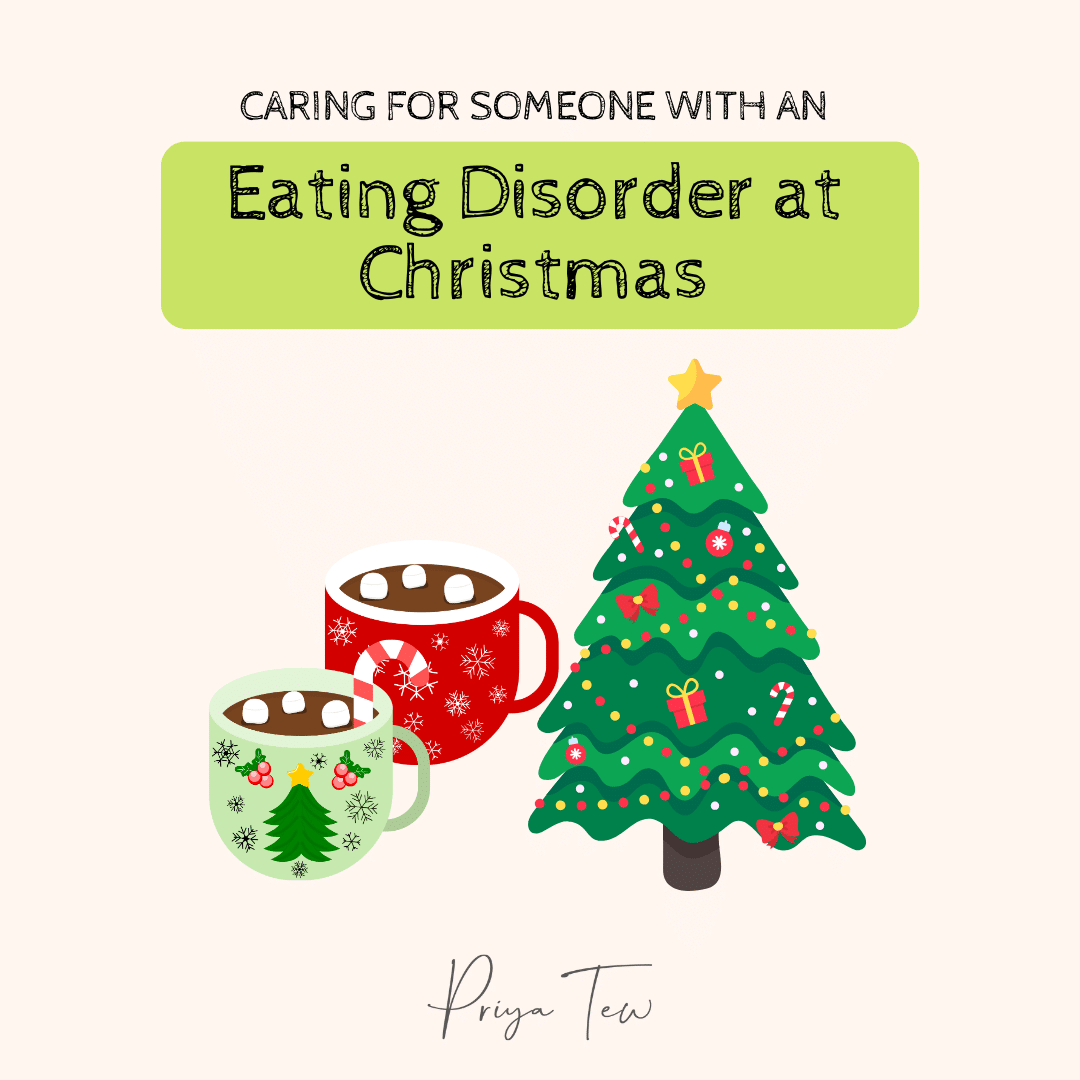
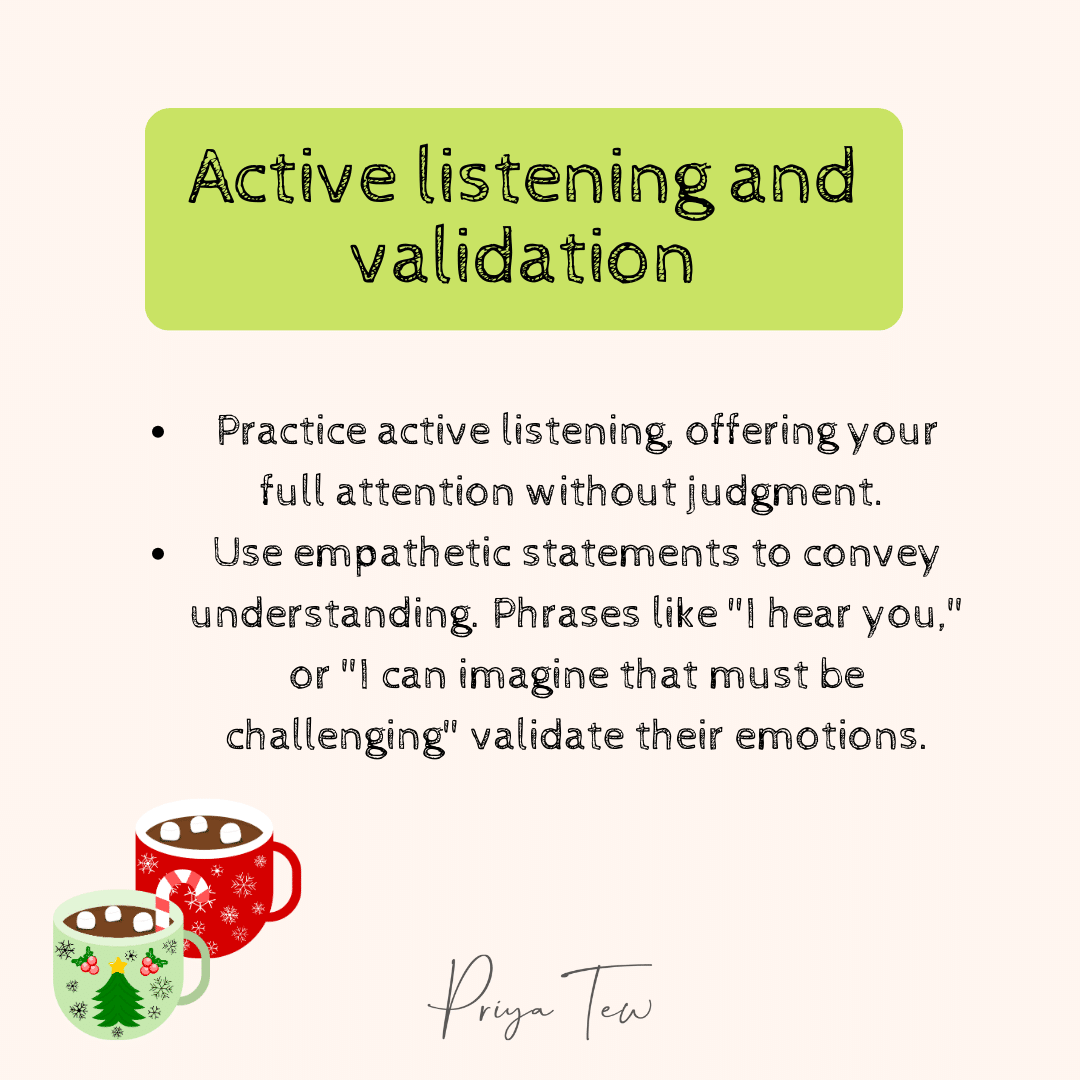
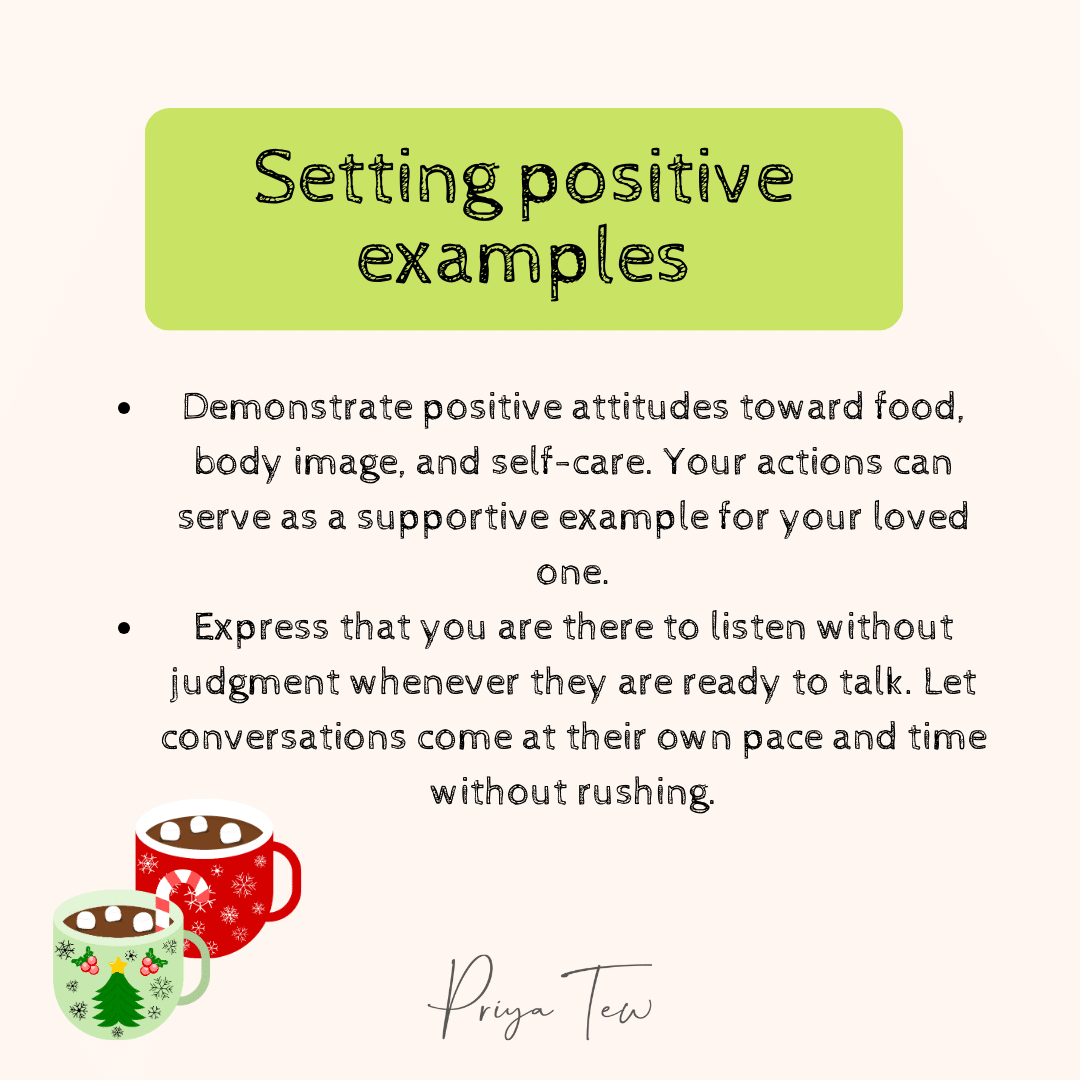
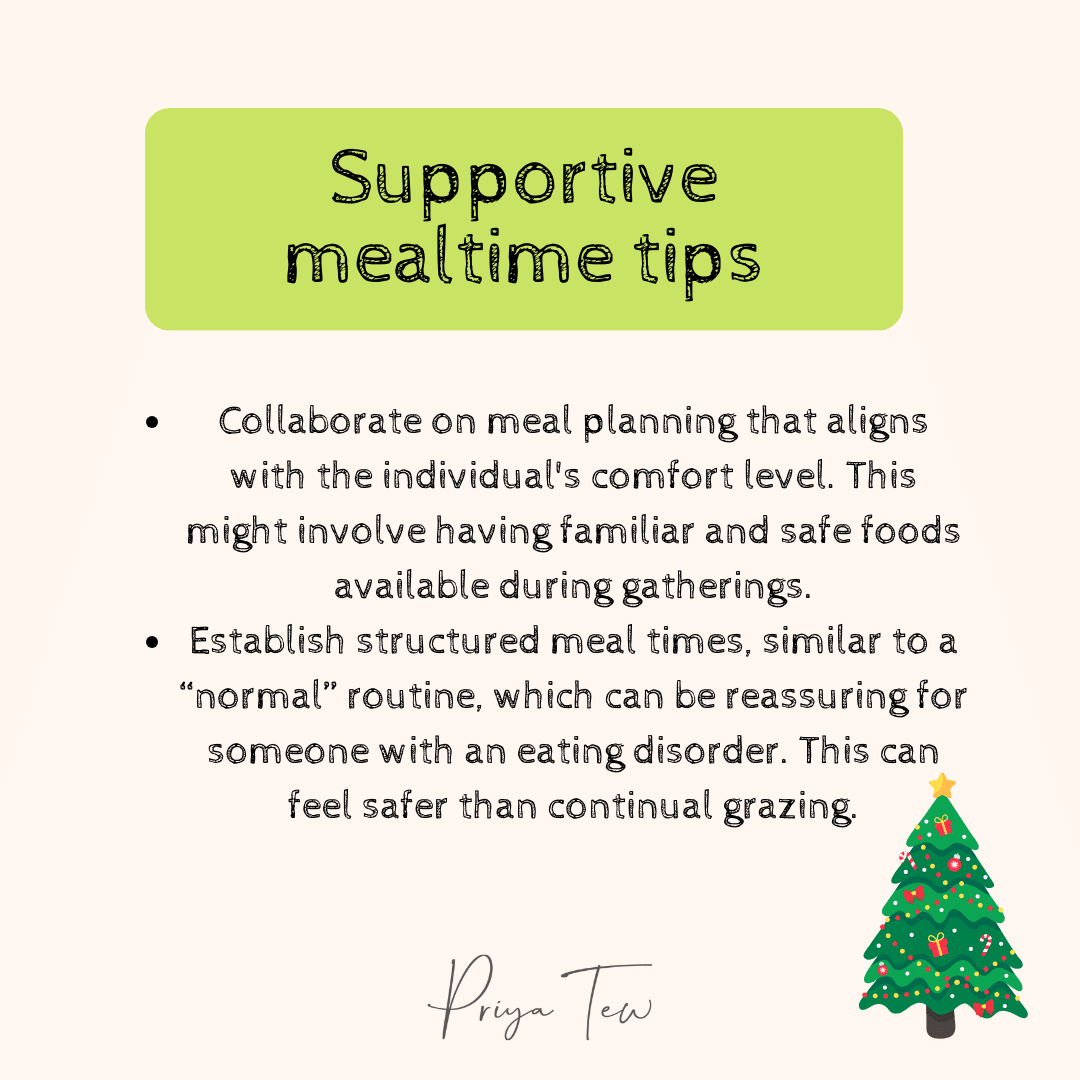
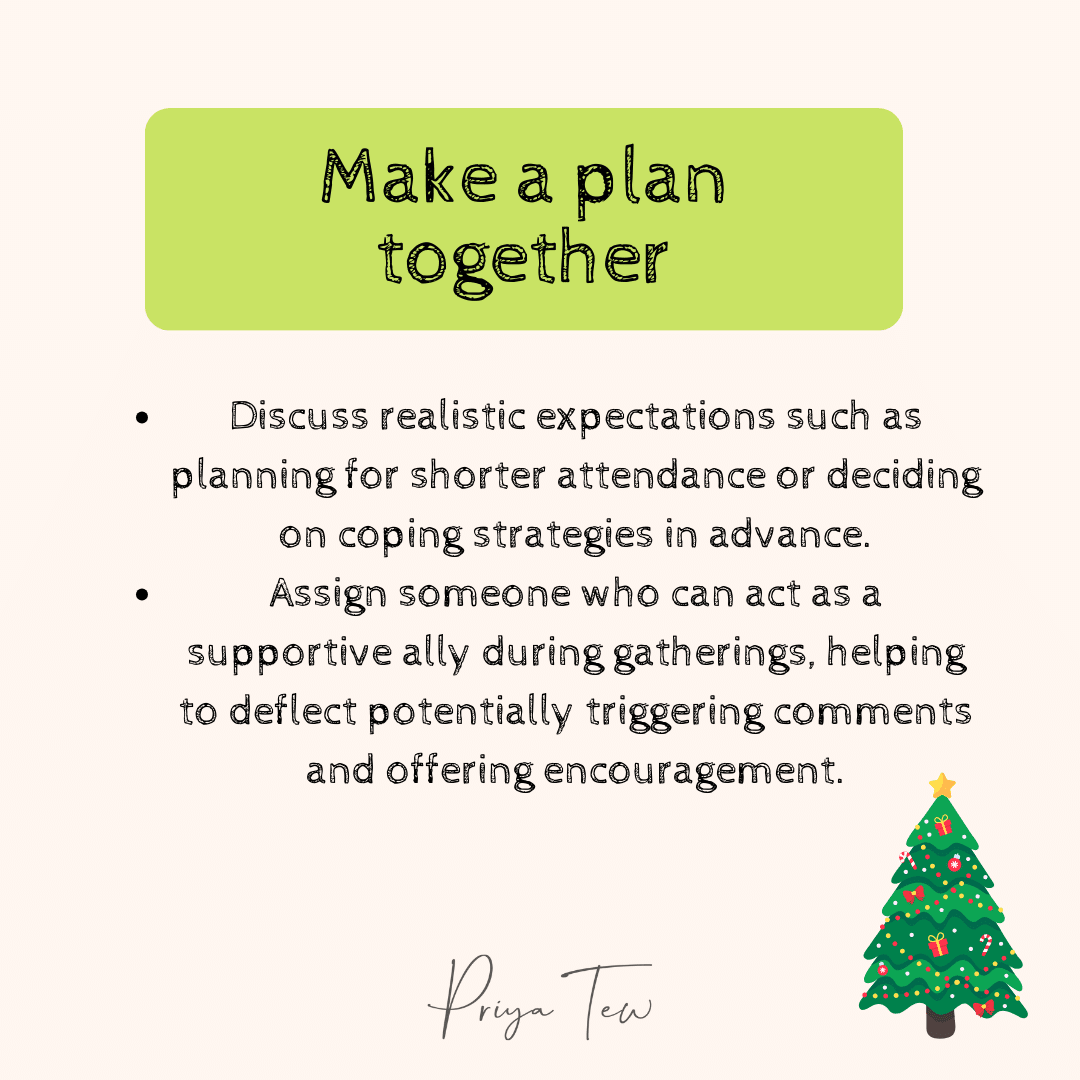
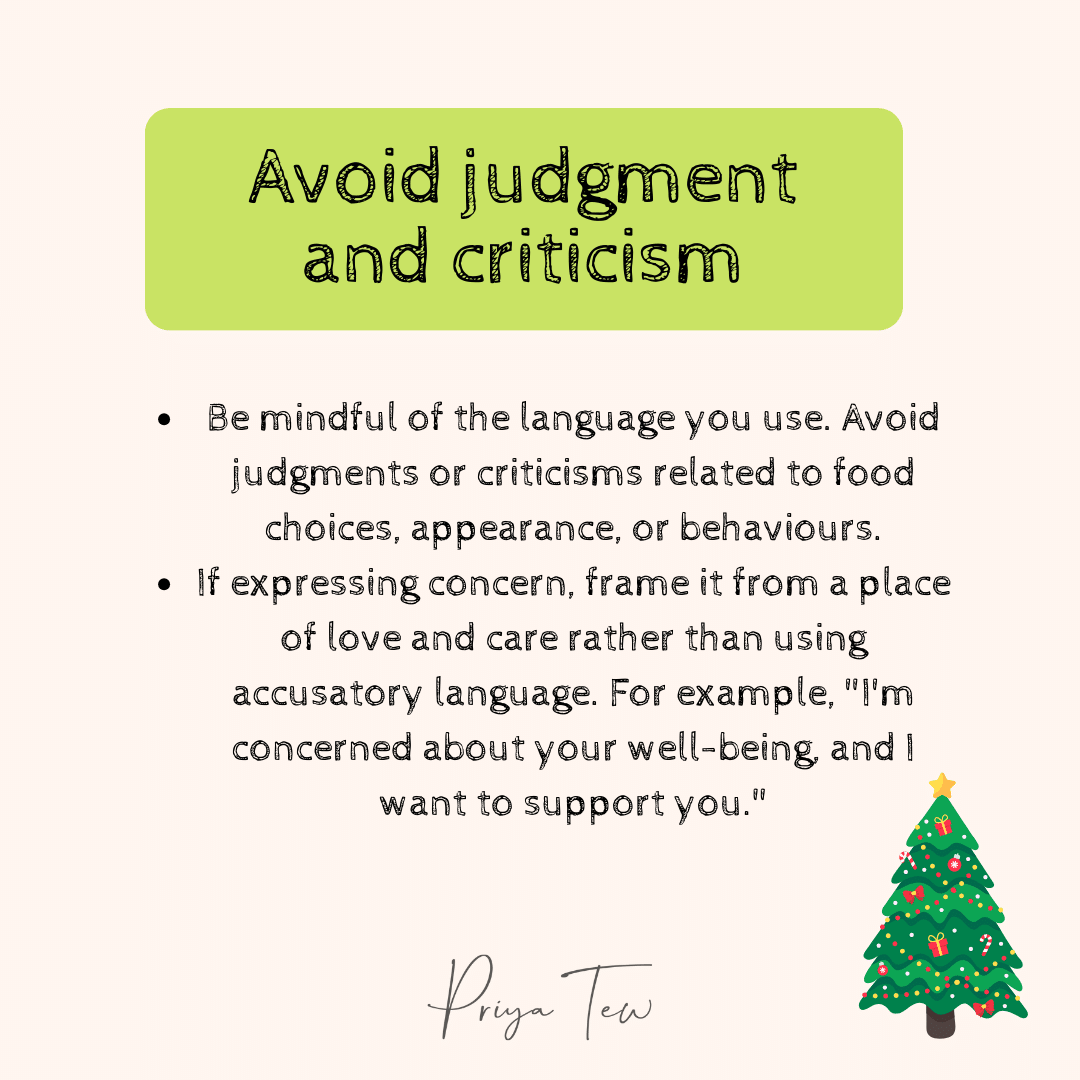
Reducing eating disorder triggers at Christmas:
Christmas can be a very triggering time for someone dealing with an eating disorder. Or in fact at any stage of food freedom recovery. To someone “outside”, these issues might not look so obvious or seem important. But they really are to someone who is struggling. Everyone deserves support whatever stage of recovery they are in. By being aware of triggers, trying to reduce them where you can or create escape options when needed, you can support you loved person. Also remember that missing a trigger doesn’t make you an unsupportive person, there can be a lot going on! Having a conversation together beforehand can help to educate yourself, and agree on strategies to manage triggers.
Understanding triggers
- Identifying potential triggers: Be mindful of potential triggers such as specific foods, comments about appearance, or comparisons to others body shape, eating and life. Triggers can be very individual, so try to learn your loved ones specific ones where possible. It may be they do not even know their triggers yet, which makes this a big learning curve. Keep a note with them of any that come up. Reflection and journalling after an event can really help. There is a lovely eating disorder journal here. https://amzn.eu/d/hAOt63x
- Creating safe spaces: Plan out comfy, cosy, safe spaces within the holiday zone where your loved one can retreat if they need a moment to regroup. Put some helpful bits there like some mindufl craft, a comfy blanket and a book to read.
Anticipating difficult situations
I’m sure we can all identify with feeling stuck in a difficult situation. Reflect on one time you can remember. Maybe you felt anxious, your heart was pounding, your breathing quicker, your thoughts spiralling. In that moment you cannot think rationally. That is how it can be for someone with an eating disorder. So it is key to have a plan.
- Planning escape routes: Discuss and plan potential exit strategies for difficult situations. Having an agreed-upon signal or plan in place can provide a sense of control. Get them to text you an emoji if they need to get out. Reassure them that they can get away and go to a safe space when they need to.
- Supportive distractions: Incorporate distracting activities after meals to shift the focus away from food. This could include a game, quiz, craft, family talent show or going for a gentle walk. It’s also okay to have distractions at the table -again, even if this is less social. Opening stockings, Christmas crackers, presents and silly games can all be a welcome distraction from the food especially after meals. Consider not sitting at the dining table for a long time after the meal has finished. Fro example, you could continue the socialising away from the table.
Dealing with comments
Seeing people who are not part of the everyday can be hard at Christmas with an eating disorder. Especially if those relatives, neighbours and family friends have not seen them for sometime. Whilst it is often part of the festive season, this may well come with unhelpful comments about weight or appearance. So it is important to be prepared.
- Prepared responses: Plan out a list of responses to potential comments your loved one can use when others ask about their eating habits or appearance. These responses can provide a sense of control and empowerment. But also if they do not feel able to do this plan out some phrases to use to explain that too. “I’m not comfortable talking about this, can we change the topic please”.
- Boundaries and redirection: Establish clear boundaries with relatives regarding the topics of conversation. Personally I suggest a ban on talking about diets, weight, shape and anything else that is triggering over this season. If it does happen (we all have those well meaning relative who do not listen), then politely but firmly redirect discussions away from food, weight, or appearance.
Compassionate communication with someone through Christmas, eating disorders recovery
Active listening and validation
- Active Listening Techniques: Practice active listening, offering your full attention without judgment. Allow your loved one to express their feelings openly, and validate their experiences. Phrases such as “how does that make you feel” “that must be so difficult, I am sorry and I want to help” and “wow I had no idea, please tell me more” may help.
- Empathy and Validation Statements: Use empathetic statements to convey understanding. Phrases like “I hear you,” or “I can imagine that must be challenging” can validate the emotions. Remember at this point your job is to support that person, they cannot support you. Please do reach out to someone else to support you through this too.
Avoiding judgment and criticism
- Non-judgmental language: Be mindful of the language you use. This is so key! I know I can easily slip into being judgemental and I have to keep working on adjusting my mindset. So if that is you too, I hear you! Work on avoiding judgments or criticisms related to food choices, appearance, or behaviours, as these can be particularly triggering. Instead of “is that all you are eating, you need more” try saying “I feel your body is going to need more nourishment, what can we add”.
- Expressing concern from a place of love: If expressing concern, frame it from a place of love and care. So muhc better than using accusatory language. For example, instead of “After all our hard work you just aren’t putting in the effort”, try “I’m concerned about your well-being, and I want to support you.” Consider whether Christmas is the best time to bring up concerns -is it urgent, or would they be better received in a week or two?
Setting positive examples
- Modelling positive behaviours: Focus on role modeelling positive attitudes toward food, body image, and self-care. Your actions can serve as a supportive example for your loved one. In our house of teenage girls I am open with them seeing my body, I don’t ever pass negative comments on bodies and we talk about how all bodies are accepted and wonderful. When they were younger we read diverse books about all cultures and stayed away from toys that showed a disorted body (I’m not a fan of Barbie). They see me taking time to read and it is well known I need to get out in nature at the weekends for my own mental health. Consider discussing things like this in your own household.
- Encouraging open dialogue: Foster an environment where an open dialogue is encouraged. Find time to just sit and chat about what matters to you and your loved one. Express that you are there to listen without judgment whenever they are ready to talk. Let conversations come at their own pace and time without rushing. Sometimes these conversations needs to be in a set session and sometimes they just happen. I have one daughter who just stands in the kitchen as I cook and tells me her problems, another daughter has a set time we chat sat on my bed. Everyone is different!

Practical tips for managing Christmas meal with eating disorders
What about the big day itself? Although the whole period can be challenging for eating disorders, Christmas Day itself can feel the most pressurised. Which means it is a good idea to have practised all the strategies mentioned in this blog in advance. Just like you may prepare for Christmas weeks ahead, buying gifts, getting foods prepped, arranging who you will see on which days… The same is needed when supporting someone with an eating disorer. You can consider November-onwards to be a steady warm up. By the Christmas week, your strategies will have hopefully provided a good buffer to eating disorder challenges.
For Christmas Day itself, try these additional tips:
Mealtime approaches for a supportive atmosphere
- Flexible meal planning: Collaborate with the person you are supporting on meal planning. Whilst there may not be 100% safe, comfortable foods available at that one meal, you can plan in some versions of foods that feel manageable. Help them decide which foods will be their challenging ones and which foods/meals need to be kept safer.
- Structured meal times: Sometimes we adopt different patterns of eating on ‘the big day’. Such as having different foods, eating at different times of the day or not having regular meals or snacks ‘to make room for the meal!’. All of these can lead to increased anxiety. So instead plan structured meal times and snacks to provide predictability, which can be reassuring for someone with an eating disorder. If Christmas lunch will be mid afternoon plan an extra snack at the normal lunchtime to help keep routine. Then a snack later that day too, cheese and crackers could be perfect! This can feel safer than continual grazing or offers of food. It also reduces food decisions to just the meal times, rather than multiple instances across the day.
- Simplify the table: For Christmas lunch itself, see if you can have less on the table. Having all the abundance of amazing food all on one table might increase the anxiety around eating and food. So consider keeping some of the food away from the main table. Then people can go and help themselves for seconds.
Encouraging helpful eating practices
- Mindful eating techniques: Introduce and encourage mindfulness practices during meals. This can emphasise the importance of savouring each bite and being present in the moment. Try some breathing exercises or a calming activity before eating. Consider if it is possible to have a less social eating set up, I want to highlight this is okay. You may even offer the choice to sit further away at one end of the table, or leaving the table early. This can reduce pressure of eating with an audience, or feeling trapped.
- Distracting Activities: Incorporate distracting activities after meals to shift the focus away from food-related anxieties. This could include engaging in a holiday-themed game or going for a gentle walk. It’s also okay to have distractions at the table -again, even if this is less social. Opening stockings, Christmas crackers, presents and silly games can all be a welcome distraction from the food especially after meals. Consider not sitting at the dining table for a long time after the meal has finished – you could continue the socialising away from the table.
Eating disorder caregivers at Christmas
By navigating triggers with sensitivity and communicating with compassion, caregivers can build a foundation of understanding and support for their loved ones with eating disorders during the holiday season. These strategies aim to create an environment where individuals in recovery feel heard, validated, and empowered to prioritize their well-being.
If you do need more support, either for yourself or as a carer, do get in touch with the Dietitian UK team. You can also access free resources from resources like BEAT.